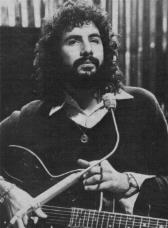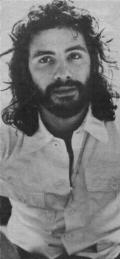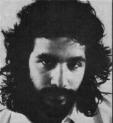| 1973
STAR MAGAZINE - A teenage girl fashion - fad magazine from the early
70's. 
- Cat Stevens - " Music is a way
of
- Expressing my moods"
Smiling shyly through a
thick mane of curly black hair, singer Cat Stevens welcomed our Star interviewer
Tony Norman to his home in Fulham, England, one recent wintry English afternoon. Sipping
hot tea and rapping about Cat’s musical successes, Tony tape-recorded the following
interview with the singer in which Cat talks about his music background and his personal
feelings about his work ~ (My first impression of Cat was that his nickname fit him very
well.. .His long, lithe and lanky figure did indeed seem very feline, as did his worldly
wise expression, imperturbable face, and flashing dark eyes. Cool and relaxed throughout
the interview, Cat sat in a comfy overstuffed chair in his den and picked at his favorite
sort of lunch, Chinese food. Although he answered each of my questions willingly, he
sometimes hesitated to part with his feelings when our rap got around to his personal
involvement with his work, and I somehow got the feeling that basically Cat is a loner in
his private life and with his emotions.
(Cat’s sleek dark
looks betray his Greek background, and he told me that his real name is Steve Georgiou
("Ste-vie" to his friends). He was born in England 23 years ago to Greek
parents• who operated a small cafe called The Moulin Rouge in London’s
swinging Soho area.
("I did go back to
Greece a couple of years ago," says Cat, but London really does more for me,
especially in the creative sense. If I lived in Greece, I would just sit in the sun and
relax my life away, but here in London I can work."
(It was in London that he
first began writing songs. Cat was a first-year art student at Hammersmith College when,
in 1965, a producer at Decca Records heard a demotape by the Cat and signed him to the
Deram label. Although most Americans aren’t aware of it, Cat Stevens enjoyed success
as a British recording star back in 1966 when he recorded a single smash hit, / Love My
Dog. Only 17 years-old then, Cat became an overnight rock n roll recording success and
went on the road as a flashy single artist. But with all the demands and pressures of
concert touring, Cat’s health wore thin and he was soon whisked to a London hospital
with tuberculosis, and his first flush of success quickly disappeared. After having spent
several months recuperating, Cat returned to the music world and found that he had almost
been forgotten. Looking back on his stay in the sanitarium, Cat now says that he did a lot
of heavy thinking then about his musical future. And when he stepped back into the musical
limelight to record his first album Mona Bone Jakon, Cat had thrown away his flashy
Carnaby Street mod image and his wistful naive mannerism.)
STAR: What was
your life like as a young boy?
CAT: Well, we
never were together as a family. My father split with another woman and the only times we
ever met were when we all worked in the cafe... was always out on the streets, wandering
around Soho or somewhere else. I was a weird kid, I used to sit up alone fill five in the
morning, doing cartoons and morbid drawings. I always liked being alone.
STAR: Would you
consider yourself a loner now?
CAT: I
wouldn’t describe myself as a solitary person or a loner. It’s just that there
are times when I do like to be left alone. It gives me the chance to be objective about
myself. To think things out. I need those periods of privacy. But that doesn’t mean I
don’t have friends. I’m the type of person who nose-dives into dark depressions,
which are just a part of me—I’m meant to be like this, so I accept it. I can
always get over the depression if I face up to it. Strangely enough, it is much worse if I
try to run away. Alone, it always works out.
STAR: Do these
moods inspire you to write music?
CAT: Yes, music
is a way to expressing my moods. You ask yourself why you are doing it. And the answer is
that when you were a kid it was a way of putting your feelings across. So now I’ve
gone back to that. I hope my songs will be able to move people in one way or another.
STAR: Do you have
any special approach to composing a new song?
CAT: No.
There’s no routine at all. It changes, it has to change. I get very bored if I repeat
the same method of writing a song over and over again. If you repeat a formula, you get
the same song.. .or something very similar. My songs have to grow by themselves. Every one
is different.
STAR: Where do
you do your writing?
CAT: I do most
of my writing at my house which is, for me, a special place. I keep one room
virtually empty and that’s where I go when I want to write. There’s really
nothing in it except a piano and a bed. I’ve got a phone, but I can always take that
off the hook if I don’t want to be disturbed. It’s one place where I can be
totally alone. It’s the place I get things done.
STAR: What was
the song that first made you popular as a singer-composer?
CAT: I Love
My Dog, I guess. But things slowed down after that and it was pretty depressing.
I’d arrive at the recording studios and all the session men would be sitting around
drinking their cups of tea and reading the racing pages of the Daily Mirror. I knew
they didn't really give a damn about my records and the atmosphere was terrible.
STAR: Was it
around this time that you got sick with tuberculosis?
CAT: Right. My
doctor said, "Mr. Stevens you are suffering from advanced tuberculosis. I must warn
you that unless you take complete rest, your life could be in danger!" So I went to
stay at a sanitarium in the country for three months to recuperate.
STAR: Was the
stay in hospital a vital period in your career?
CAT: For sure. I
had a lot of time to think and to decide in which direction I wanted to go. The changes
all stemmed from that period. Actually I’ve been through a similar period just
recently. The past three months have been a real eye-opener for me. I feel like I’ve
done a whole year’s living in that time. I’ve found out many things about myself
and those around me. After I got out of the sanitarium I started a brand-new image for
myself. I threw away my old Carnaby Street get-ups, took up growing a beard and played an
acoustic guitar.
STAR: So when you
came back from the hospital, you experienced your second success with your album Mona
Bone Jakon, right?
CAT: Yes, but I
feel that the song that really did it for me the second time around was Father and Son
on Tea for the Tillerman LP. I really worked on that and it changed me. I had
something I wanted to express here about life.
STAR: My favorite
song on Tea For the Tillerman is Longer Boats. It’s a curious song.
Would you explain what it means by, "Longer boats are coming to win us—hold
on to the shore, or they’ll be taking the key from the door...?"
CAT: One thing,
Americans try to make too much of my songs. They’re lust songs. I don’t know why
I write them. But they try and find all kinds of hidden meanings in my songs. Longer
Boats is actually about flying saucers. One night I was lying back in bed and I saw
this flying saucer shoot across the sky and stop over me. And it sucked me up into it.
When it put me down, I shot up in bed. I knew it wasn’t a dream, It didn’t feel
like a dream, It was real, I know it was real.
  
STAR: How did
success feel to you the second time around—was it any different from the first time?
CAT: In one way,
all success is the same, It means that what you’re doing is going out at the right
moment and it’s being accepted. Everything’s rolling. I had that going for me
when we did / Love My Dog and those other records. But in many other ways what
I’m doing now is totally different and perhaps I’m going to change again. But
probably the main difference now is that I have more power now than I had when I started
out. I mean, I have control in the studio and over the things I do. But it could be that
I’m just fooling myself on that. In the past, record company people told me what to
do. Now the people, the audience, are doing the same. They say, this is what we like from
you. Can you do it again?
STAR: Did success
affect your music?
CAT: One thing,
when you are in a situation where you are making a lot of music several times a week,
there’s a real danger of the whole thing becoming clinical. So you have to stop and
think and go back. It’s difficult to judge, once you’re a success. People love
anything you do. But I don’t want to copy anyone else.
STAR: How do you
feel personally about your music?
CAT: My guitar
playing is horrible. People have wanted to teach me to play better, but I never studied
from anyone. I enjoy how I play. But I’m really my own best critic. Somebody wrote a
bad review of the show I did at the Albert Hall recently and I was really emotionally
upset by it. The whole day was ruined when I read it. I felt terrible. Some of the things
he said touched me and they were valid, but in other ways he completely missed the point.
That’s what happens when you throw yourself into a puddle and somebody else picks you
up.
STAR: Success
means money—has it affected you?
CAT: In order to
get your music accepted by lots of people, you have to earn a lot of money. That’s
the way it goes. If you want to communicate some very strong idea, it’s linked
closely with making financial bread. I sometimes ask myself if it’s just for the
money or if I still am really worried about the music. In some ways the money can be a
heavy burden. I like to feel free, you know, and when I had nothing I found it easier to
relax.
STAR: During
concerts and personal appearances, how do you feel you best interact with the audience?
CAT: I just talk
about anything that comes into my head. All I want to do is get some sort of communication
going. I never remember what I’ve said on stage and I hate listening to it being
played back, at the time it seems to help things to get moving. I actually draw a parallel
between breaking the ice with an audience and with people I meet in my private life,
It’s always the same. In the beginning I’m always slightly reserved, and hold
back a bit. It takes time to really feel relaxed. But once you are over that, then you can
really start moving. That’s when It gets really good.
STAR: Are you
working on a new album?
CAT: Yes, this
is my chance. I want the next album to really be something very special. I’ve got
lots of songs at home which could be used for another album with a similar formula to Catch
Bull At Four. But that wouldn’t give me any real satisfaction. I want the
next one to stand up on its own. I get the most satisfaction from the music when I’m
actually writing the songs. After that you go out and sing them at concert after concert.
You squeeze the songs, searching for anything you can find in them and in the end they
just feel dry. The only way I can overcome that is by completely losing myself in the
music. You have to work at that. It’s difficult. But by that stage what’s really
driving you is the thought of what you are going to do in the future. I he next
song—the new album. They are the important things and I want my next LP to be a real
progression. This is my chance.
STAR: Do you
listen to your own albums—what kind of music do you dig?
CAT: No, I
completely lose interest in my albums after I’ve finished them. I want to get rid of
it and move on to something else. I hate listening to my own records. The only time I play
them is when I’m with my family because they like to hear them. Personally I’d
rather hear other singers. Stevie Wonder is very big for me right now. I think he’s
incredible, I really do. But really, I like listening to all sorts of music. This morning
I was playing Japanese music, electronic music and The Dubliners! I like anything that has
some force. I don’t care what it is. Of course, I enjoy Greek music. Strangely enough
it has helped me to understand and feel black music, which I love. English music seems to
stem from tradition. Black music has its roots in feelings and emotions. The black
musicians really feel their music because it’s in their blood. I think it’s the
same thing in Greece.
STAR: Are you
happy with your new success?
CAT: Oh yes.
Much happier, really. But even now I’m getting to a point where I feel I want to be
even happier. This is obviously the answer to a lot of things, just feel happy. And the
greatest joy in writing a song is being able to sing it to somebody. Once I’ve
written something I want to play it to whomever wants to listen.
STAR: We’re
always ready to listen; thank you Cat Stevens

1973 STAR MAGAZINE
- A teenage girl fashion- fad magazine from the early 70's. |